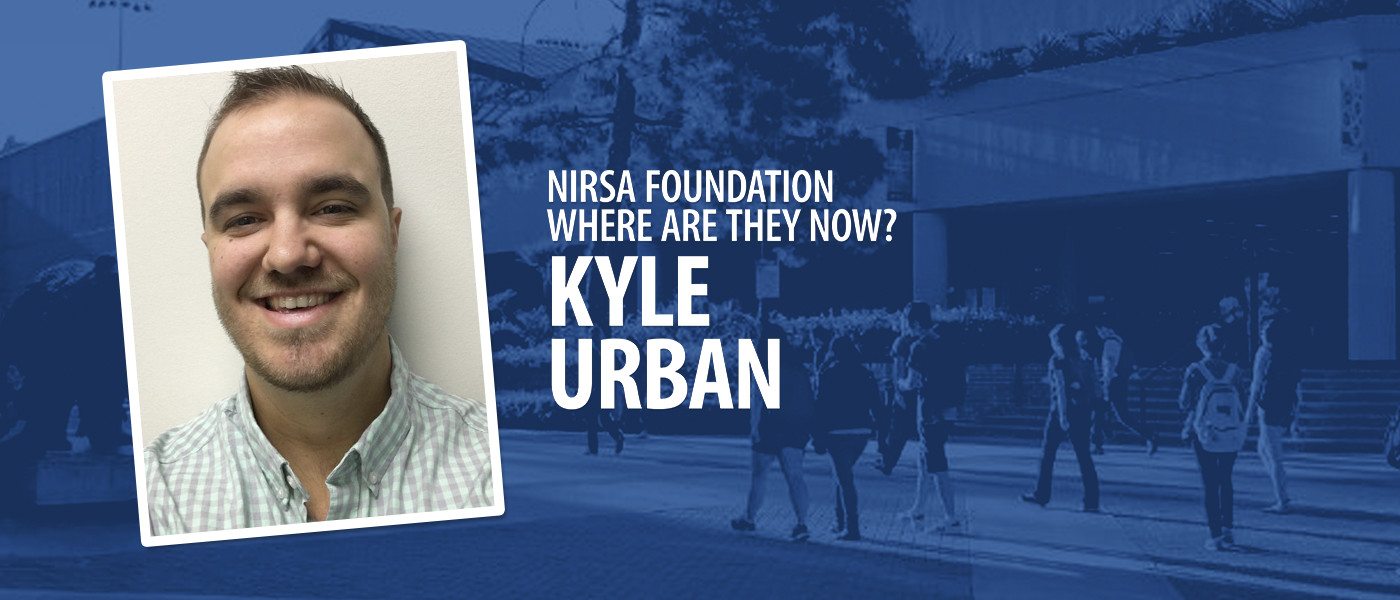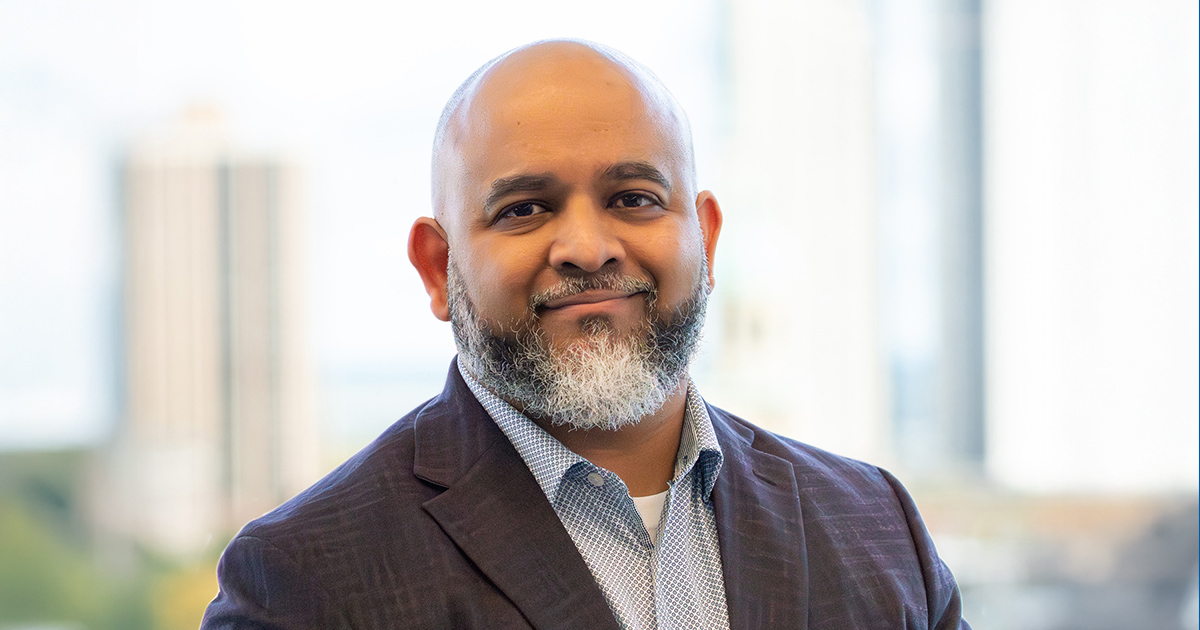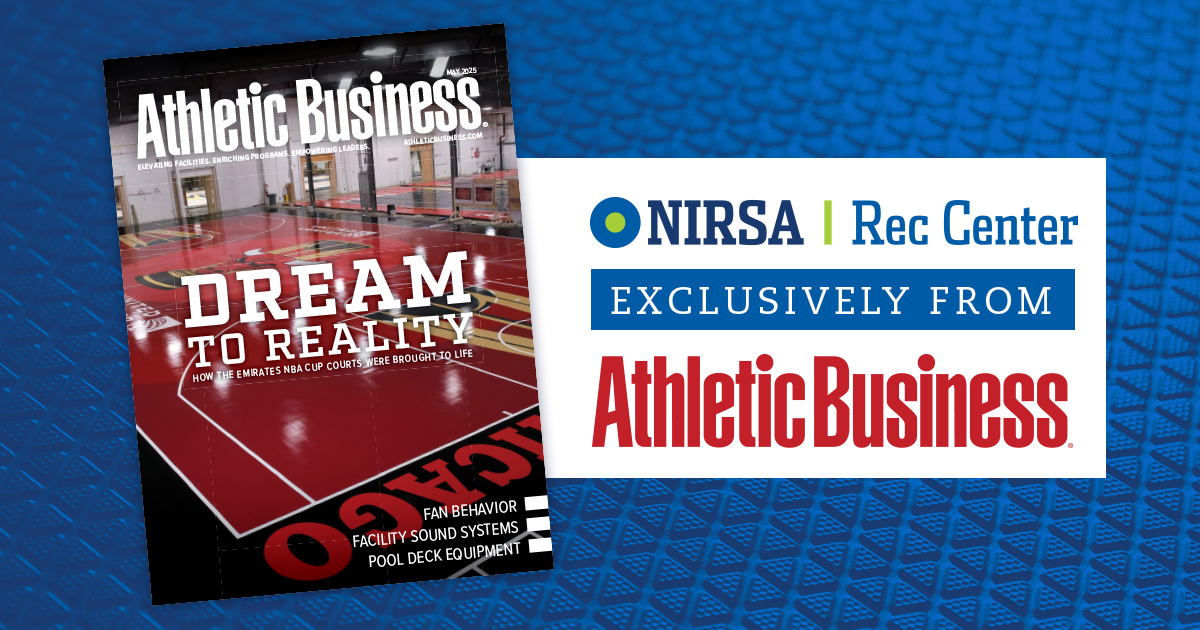When Kyle Urban started school at the University of California, Davis, he didn’t know that collegiate recreation was a profession, let alone foresee that he would one day end up with a career in it. “I knew community recreation existed,” he explains; but he didn’t yet realize how significant recreation could be to the overall college experience.
Early in his freshman year at UC Davis, Kyle took an on-campus job in the dining hall working as the setup man for the Mongolian wok. Unfortunately, he quickly discovered that the job wasn’t a good fit. The work didn’t give him a chance to connect with the larger campus community and meet new people—both things he really values. It was while playing on an intramural team during his first quarter that he became interested in officiating and decided to try out to be a basketball official. He got the job and has been happily working in the recreation field ever since.
Beginning a career in collegiate recreation
It was at his first NIRSA Annual Conference in Anaheim—a fortuitous local conference for the then sophomore—that Kyle says he “really got hooked” on collegiate recreation. The conference was NIRSA 2010, and it was a real launching point for him. Afterwards, he says, “I started participating in regional tournaments as well as going to regional conferences and really just started to branch out and make my own connections.”
Not unlike many collegiate recreation professionals who have benefitted from a commitment to mentorship that is fostered by the Association, his introduction to NIRSA and the profession was furthered by the guidance and support of wonderful individuals like Andrew Ramirez, Senior Assistant Director of Programs at UC Davis, and Tyler Scudero, Assistant Director of Informal Recreation at UC Davis.
Over the course of three and a half years at UC Davis—three years as an undergrad and six months in a para-professional position—Kyle worked his way through a number of positions, working primarily in competitive sports while also getting some experience with both summer camp and aquatics programming.
At UC Davis, Kyle had the opportunity to meet Tom Kirch, retired Director at Oregon State University and NIRSA Foundation Board Past President. “I served on a student panel that met with Tom and two other directors from across the country,” Kyle explains. “Tom stuck around for an extra 20 minutes to tell me about Oregon State’s recreation program, and I expressed my interest in working there.” That short conversation ultimately led Kyle to applying for a graduate assistant position at OSU and sparked a mentor relationship that lasts to this day. “I value Tom’s mentorship and the guidance he’s given me throughout my career,” says Kyle, “and look forward to more conversations in the future.”
Kyle managed to land the Oregon State GA position where, he says, “I was able to work for some of the best people I’ve ever met as a member of the Sports and Special Programs Office.” During his time at OSU, Kyle worked with club sports, intramurals, and facilities for the university and served as the NIRSA Student Leader for Region VI. After two years at OSU, and with some encouragement from Tom, he applied for and was offered his current position at the University of California, Los Angeles as the Competitive Sports Coordinator. He’s held that position since 2014.
The value of collegiate recreation
Kyle was a psychology major as an undergraduate, which involved taking a number of health psychology courses, and in grad school he was introduced to sport and exercise psychology. He has an academic understanding of the benefits of physical activity—or recreation—on the human body. “For most people, it’s a really good thing,” he explains. “It expands the mind and gives you an opportunity to really expand the way your body operates, and to push yourself to the limits. I think when you give yourself that opportunity, it’s very liberating.” He goes on to say that while science says exercise is good for you physically, it’s important to remember the mental benefits it has as well.
Recreation “offers opportunities for students to get away from their day-to-day, to separate themselves from the books, from class, from the library—from whatever stresses they may have and just kind of relax for a little bit,” explains Kyle. He is all for promoting an active lifestyle, but believes it is just as important to give students a chance “to release those emotions that they might not be able to in class and to find an opportunity to make friends outside of a classroom context or a structured social context.”
For Kyle, the benefits of collegiate recreation go far beyond just physical wellbeing, and he’s thankful that NIRSA recognizes those benefits as well in the values it champions and the research it supports. Within campus recreation, “I think we have the perfect environment to help students maximize their ability to be successful on campus,” says Kyle.
His outlook on recreation certainly fits with his perspective on his own work within the field. “For me,” Kyle says, “being in the business of making other people happy is something that I can find a lot of passion for and a lot of fun in. It’s great to provide that kind of positive experience for other people.” Working in the field is about more than individual daily accomplishments, “it’s about looking at a campus and understanding how your particular program is impacting the campus’ wellbeing. It feels really good to be involved with that.”
An active member of NIRSA: Leaders in Collegiate Recreation
Kyle’s entire collegiate recreation career has taken place in NIRSA Region VI, which he finds very fortunate. “Anyone that’s worked in Region VI can tell you that we’re a region that looks out for one another—we’re a tight knit family,” he explains. “A lot of my Region VI colleagues have watched me grow up—literally and figuratively—over the last 8-9 years, and I’ve been afforded the opportunity to work with many folks who have had a significant impact on my life personally and professionally.”
NIRSA and the NIRSA Foundation matter to Kyle, and he is the recipient of two scholarships from the Foundation. He attended NIRSA 2012 in Tampa as an undergrad and was able to engage in more educational sessions than ever before. He recalls it as “an important conference for me to learn more about the profession and our wonderful Association.” His professional scholarship, which he received during his second year at UCLA, helped him get to NIRSA 2016 in Kissimmee where he successfully presented an educational session despite suffering a bout of laryngitis.
Paying it forward by giving back
Kyle feels incredibly honored to have received both of those scholarships. He views them as signs that “our Association takes care of its own,” which motivates him to continue his involvement with NIRSA and to continue trying to better the Association in whatever ways he can.
For him, this means giving back on an annual basis. “I’ve found so much love for our Association through my years as a member. While receiving a scholarship is nice, giving back to support the next generation of rec sports professionals is what it’s all about,” he says. “Without the scholarships I’ve received, I know that my experiences wouldn’t have been as great, and I take a lot of pride in giving back—even if it is in small increments—to the NIRSA Foundation and our Association as a whole. I encourage everyone who is a NIRSA member to donate periodically throughout the year!”
The Association and its membership remain committed to supporting the new rec professionals who are the future of collegiate recreation. This plays a large part in why NIRSA Foundation scholarships exist and why mentorship is so integral to the profession.
The power of association
When asked if he has advice for current students and future rec professionals, Kyle has plenty to offer.
His first bit of advice is that “You should never be afraid to ask the NIRSA professionals around you for help.” NIRSA members want to support one another. It just doesn’t make sense not to take advantage of such great resources.
Another piece of advice he has is to “leave the door open to opportunity.” Essentially: you never know what or who will shape your future. “Chance meetings, unexpected events and mentor-mentee relationships have the ability to shape your career, and that’s ok! You have to learn to be comfortable with the unknown in our field,” says Kyle.
His final piece of advice is to not be afraid of failure. You will never get an opportunity you didn’t apply for.
“NIRSA has become like a second family to me,” says Kyle. “I’ve got folks who are going through the same things I am all over the country, who I can lean on when I’m having a difficult time. I’ve got folks who have been in my shoes before who now have a lot more experience and are able to give me advice in difficult situations.” He adds, “And I think I’ve got a lot of people to celebrate successes with when we all accomplish things as an Association.” For Kyle, “NIRSA is kind of a melting pot of a lot of things that are right in the world.”
NIRSA remains as committed to its membership as its members are to it. The Association is proud to support student development and research advocating for the field. After receiving two NIRSA Foundation Scholarships, benefiting from years of mentorship from Association professionals, and seeing firsthand the positive impact that campus recreation can have on students, Kyle knows there are real benefits to staying involved and invested in NISRA: Leaders in Collegiate Recreation.
Kyle’s experience—as well as those of hundreds of other students and volunteers—is made possible by generous donors to the NIRSA Foundation. Learn more about how they are working to strengthen the future of collegiate recreation and how you can support their efforts.
- If you’re interested in sharing your story, please contact NIRSA Foundation Board Member Chris Muller, or NIRSA Foundation Coordinator Kameron Carroll.
Nazifa Islam was previously the Communications Coordinator at NIRSA.








